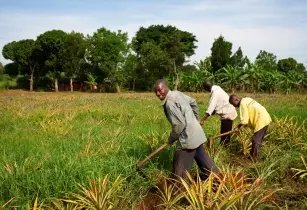Khaled Sherif, vice-president of African Development Bank (AfDB), announced new investment strategies like providing high-yielding seeds and making large farms more productive to boost up Africa’s agriculture sector during the 52nd session of AfDB annual meetings in Gujarat, India, which was held from 22 to 26 May
According to Sherif, the proposed strategies would effectively alter the market structures around the world in favour of the African farmers of major cash-crops like tea, coffee and cocoa.
The bumper harvest of cocoa has led to excess supply in Cameroon, Ghana and Côte d’Ivoire, where cocoa is the main cash-export crop. This has created a huge dip for the economics of the west African countries, leading to a price loss of US$1.2bn.
Sherif said that the losses could be curbed with proper investment strategies in the continent’s largest cash-crop producing regions like west Africa and east Africa. The strategies like warehousing and improving the value chain infrastructure would effectively control the supply of the crop, and the market booms and busts would be managed.
Also, the investment in large storage facilities would enable the governments of those countries to manage the release of raw cocoa beans into the world market in order to stabilise the prices.
To correct the obvious imbalances in the regional production of major crops, AfDB is raising funds and hopes to invest US$2.4bn each year for 10 years to provide credit guarantees to farmers undertaking large agricultural sector investments.
AfDB has raised fund worth US$853mn from the Africa50 Infrastructure Fund and another US$1bn syndicated loan for risk guarantees, said Akinwumi Adesina, president of AfDB.
According to the AfDB, Egypt spends US$20bn to import wheat from Kansas, in the US, while farmers in neighbouring Sudan have adequate land which could be cultivated to produce the crop for export.
AfDB is looking forward to create a big market through land leasing, reducing the amount of idle land and improving the land productivity. AfDB aims to ensure that the farmers and the landowners earn a fair share from land ownership.




